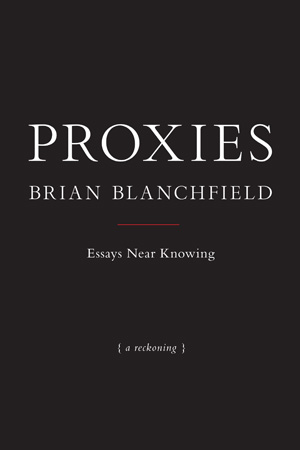Essays Near Knowing

PROXIES:
A go-for-broke essay collection that blends cultural close reading and dicey autobiography.
$12.99 – $18.95
Additional information
| Weight | .6 lbs |
|---|---|
| Dimensions | 5.5 × 1 × 8.2 in |
| Format | eBook, Paperback |
Past compunction, expressly unbeholden, these twenty-four single-subject essays train focus on a startling miscellany of topics —Foot Washing, Dossiers, Br’er Rabbit, Housesitting, Man Roulette, the Locus Amoenus—that begin to unpack the essayist himself and his life’s rotating concerns: sex and sexuality, poetry and poetics, subject positions in American labor (not excluding academia), and his upbringing in working-class, Primitive Baptist, central-piedmont North Carolina.
In Proxies an original constraint, a “total suppression of recourse to authoritative sources,” engineers Brian Blanchfield’s disarming mode of independent intellection. The “repeatable experiment” to draw only from what he knows, estimates, remembers, and misremembers about the subject at hand often opens onto an unusually candid assessment of self and situation. The project’s driving impulse, courting error, peculiar in an era of crowd-sourced Wiki-knowledge, is at least as old as the one Montaigne had when, putting all the books back on the shelf, he asked, “What do I know?”Listen to Brian Blanchfield read from and speak about Proxies on KCRW’s BOOKWORM.
Praise
Maybe short says it best. Sexy book.
Early on his humble and stunning Proxies, Brian Blanchfield asks: “In what kind of place is all the hearing overhearing?” He knows, mostly we eavesdrop on ourselves. We call it thinking. There is no delicacy of mind like that one that moves through the facts of its own errors to arrive at understanding, and here, essay by essay, Blanchfield sifts through the astray archive of his memory to recall what all it is he needs to live. These essays remind us, as they discover inside themselves, the deep virtue of saying, “I don’t know.”
Brian Blanchfield’s sentences are modern marvels. They coil, insinuate, embellish—and then land on the tender spot. If Hart Crane had survived to write a book of autobiographical essays, it would resemble Proxies—but would Hart have given us the low-down on frottage? Blanchfield is a staggeringly accomplished stylist, whose artful elucidations deserve to be savored, studied, and, yes, worshipped.
Proxies: Essays Near Knowing brings a slowed-to-meaning lens to the remembered moments of a life. Blanchfield’s readers wander into his ordinary-extraordinary quotidian—the vulnerable longing of a singular voice expressing a peopled intelligence. Not since Hilton Als’s White Girls have I read anything as interrogative, unsettling, and brilliant.
Into what some are calling a new golden age of creative nonfiction lands Brian Blanchfield’s Proxies, which singlehandedly raises the bar for what’s possible in the field. This is a momentous work informed by a lifetime of thinking, reading, loving, and reckoning, utterly matchless in its erudition, its precision, its range, its daring, and its grace. I know of no book like it, nor any recent book as thoroughly good, in art or in heart.
The quiet but searing vulnerability in Brian Blanchfield’s writing is as wide and trembling as the wingspan of his otherness. He writes with a beguiling sagaciousness that made me bow my head so many times that I lost count. These are essays about honesty and the revelation of self in which shame and guilt are dissected and anything extraneous scrubbed away. Each sentence is a live wire. Diverse, maybe mismatched styles, genres and topics accrue to great and moving effect, a profound whole made from an unlikely assemblage of parts. He appears to be forging a new genre before your very eyes.
Details
Reviews
It is idle and superficial, argued Montaigne in his essay “Of Pedantry”, to take the knowledge of others on trust. “We must make it our own.” Inspired by the sixteenth-century French philosopher, Brian Blanchfield switched off the internet and swivelled away from his books to confront the question, What do I know? It is tempting to state, from the start, that he knows quite a lot. In a four-page essay about language acquisition, “On Propositionizing”, he swings comfortably between Helen Keller and Heidegger, Walker Percy, Noam Chomsky, Donald Winnicott, Aristotle, Roland Barthes, Muriel Rukeyser, Thomas Traherne and Albrecht Dürer. His fondness for arcane vocabulary – words like narreme, geophagy, sempiternal, scopophilic and detumescence – is impressive, but also irritating. If you can forgive that, along with a tendency to name-drop and construct some sentences so awkwardly that they require repeated re-reading, Proxies rewards perseverance. For at the heart of…
At the height of the Aids crisis in the late 1980s, the American poet Brian Blanchfield was a teenager coming to terms with his sexuality. His sense of his emergent identity became bound up in the suffering of the gay community at large — “not just their appreciable agony but also their leprous toxicity”. Sexuality and group solidarity feature prominently in the essays comprising his prose debut, Proxies: A Memoir in TwentyFour Attempts. Blanchfield recounts his fraught relationship with his deeply religious mother, who refused to accept his homosexuality and was affronted by the personal candour of his first, critically acclaimed poetry collection. Years later, while composing his second book of poems, Blanchfield noticed he was writing in the first-person plural by default; he had found, in his network of friends and lovers, a surrogate family.
The author’s romantic life seems to have mirrored his professional trajectory. In these recollections he is inveterately nomadic, moving from one temporary teaching post to another, and from one relationship to another. Often a break-up would coincide with a change of job, the latter necessitating or hastening the former. So Blanchfield is understandably unnerved when, hours after rejecting a teaching post many miles away in order to remain with his current boyfriend, he has an inauspicious collision with an Arizona tumbleweed: “What does it mean when the universal symbol of itinerancy knocks into you the day you committed to stay awhile?” The couple insert a disco ball into it and use it as a chandelier.
Blanchfield stews with weary, sardonic humour over the vagaries of the applications system for academic positions. He recalls excelling himself during one particularly convoluted interview process, only to discover he had missed out to an internal hire. The outcome was predetermined; the entire exercise had been a pointless charade. (“It made sense of the unnerving disengagement I had perceived from the faculty . . . ”) He cuts a despondent, rankled figure in these passages, admitting that “hurt and cynicism have . . . compounded the basic demoralization of spending the effort against such odds and in a climate with so little transparency”.
Several of these essays explore the numinosity of language, and how this is reflected in the instability and malleability of identity. “[L]yric speech,’ Blanchfield observes, “is always, rather mysteriously, someone else’s.” He remembers his childhood aversion to the “verbose musicality” of church diction, yet concedes that he has recreated, in his own writing style, “the immersive experience of enigma which so repelled me as a child”. This is not false modesty: there is indeed, in the homiletic pacing of his prose, a discernibly churchy whiff. But this does not extend to the content. In his colourful essay “On Frottage”, Blanchfield celebrates the subversive creativity of non-penetrative sex in all its “busy reciprocity”. It represents, for him, the promise of sexual mores “more supple and adaptive to the precariat fluidity of contemporary living” than conventional intercourse.
The story the essays in Proxies gradually tell would be a compelling one in almost any method of telling. Blanchfield discusses his relationship to his family; the aftermath of his stepfather’s death; his complex and conflicted relationship with his mother, especially as it relates to his sexuality. But for a book that’s this intensely personal, the effect of finding out how Blanchfield remembers certain things can also be illuminating. It’s one thing to write about your life with this kind of candor, but another entirely to essentially provide readers with a map of how your mind works…Deftly written, frequently moving, and narratively compelling.
“Proxies,” by Brian Blanchfield — an essay collection that appears at first dry, didactic, even perverse. I enjoy art that antagonizes you, and then, slowly, in an emotional striptease, reveals a gooey, loving center. Blanchfield’s sentences have incredible rhythm.
Blanchfield’s project pitches us back behind Descartes’ certain subject who doubts only as a step toward knowing, to a Montaignian roaming, embodied, feeling consciousness. Blanchfield’s courting of error becomes a brave and radical attempt to rethink the self…Blanchfield’s analyses are keen, and Proxies establishes him as a key thinker in contemporary poetics, queer theory, and cultural criticism.
Like M.F.K. Fisher, Blanchfield often begins by standing us at a safe speculative distance, allowing us to consider the complexity of human endeavor without immersing us in its messy physicality, so that when he finally does plunge us into the intimate details of his own autobiography — with excruciating honesty — we are left defenseless. Armed with mind only, our hearts and guts are left vulnerable, and the narrative tears them open…[The technique] seems to arise out of a deep humility in the face of complex emotion, a diffidence that relies on the intellect to prepare both writer and reader for the soul- and body-baring disclosures to follow….This is humility as seduction: you can’t help but trust him and lower your guard. Then you lean forward, listen closely, and follow wherever he leads.
Brian Blanchfield’s brief, multivalent essays are titled to echo the master of the form, Montaigne. They include ‘On Withdrawal,’ ‘On Tumbleweed’ and ‘On House Sitting.’…Mr. Blanchfield’s more high-flown reflections [are] slyly used in juxtaposition with the plain-spoken memories of this ‘working class white boy’ from North Carolina….He calls the essays “inroads to disinhibited autobiography.” One becomes acclimated to, and impressed by, the way he transitions from, say, an etymological investigation of billiards terminology to the way his father shot pool.
[These essays] are little wonders of ghosted knowledge. Each entry works like a bridge suspended between feeling and fact…Blanchfield’s approach, his dispositif, affords him the freedom of the self-governed; his erudition and sensitivity to his own life experiences — growing up as a Primitive Baptist in North Carolina, for example — wall his thoughts like a garden. There his apposite selves wander apart, only to meet at the end of the path. What do you find when you allow the poetry of self-trust to guide you? Commonalities — new ways of living. The reanimation of old forms. You could almost call it knowledge.
It’s a beautiful book, and as the essays move forward chronologically…the voice is immediate, musical, and easily speaks about both theorists like Jose Muñoz and his dad’s truckdriving and barroom hustling. Blanchfield blends the intellectual and the personal projects of the essays, in a form where “lifewriting is indistinct from a kind of free intellection,” as he says of Maggie Nelson and Alison Bechdel.
Blanchfield’s best known as a poet, and though poetry shows up here as a subject, this isn’t a poet’s essay collection, meaning that these aren’t hyperlyric half-prose essays shot with the poetry cannon: this is a book of excellent prose written by someone born to write exactly this. These are high-wire acts that are a ton of fun to read…performing close readings of cultural phenomena and tracking—with great, even heroic care—minor and major emotional transactions and tendencies. The result is a book of dynamic, thoughtful, and flat-out moving essays.
The 25 essays in this collection from poet Blanchfield are small, highly polished jewels that together form an intricate mosaic. Giving himself the project of following a thought to its uncomfortable edges, in each entry Blanchfield picks a subject—foot washing, authorship, owls—and examines it from several angles until the connection between metaphysical principle and lived experience suddenly crystallizes, often producing an analogy as surprising as it is lovely. Blanchfield will typically betray a glimpse of erudition—a reference to cult cinema, Greek tragedy, or Noam Chomsky—alongside raw confession, balancing “a poetics of impersonality” with “disinhibited autobiography.” Thus, the billiards term “leave” proves connected to his father’s departure, a meditation on ingénues extends to his experience of 9/11, and the story of a dog bite becomes the story of his coming out. The themes of secrets and concealment pervade the collection, as does a “spellbound trade in vulnerability and openheartedness” conjured by Blanchfield’s prose style, with its catch-and-release rhythm—sometimes lyrical, sometimes barbed. The concluding essay “Correction,” which fills in or corrects details for the other selections, offers its own tribute to the processes by which we construct meaning—the real subject of this elegant and astonishing book.
The breathtaking excellence of Proxies, poet Brian Blanchfield’s first collection of personal essays, is an urgent reminder of how shortsighted it would be to take identity politics as the sole measure of value in queer writing. Blanchfield—who is white, male, and gay—does not treat these contours of his life as extraordinary in themselves. He attends instead to the subtlest registers of misfit between a queer self and its world—and with such sensitivity, he provides a startlingly detailed map to a territory we only thought we knew well. Again and again, he finds unexpected grace in grim circumstances: growing up gay in working class North Carolina, struggling to find his vocation in heady millennial New York, reckoning with the diminished economic prospects of the writer’s life…I mentioned grace…and I locate this quality not in the book’s procedure, or even in its charged confessions of shame. The grace is most present in the, yes, poetic way that Blanchfield observes his own darkest qualities mirrored back to him in his surroundings—as perceptual patterns, omens, even blessings.
VERY MUCH LOOKING forward to the poetry collection that will be the sequel to A Several World, but glad to have this.
The twenty-four essays in Proxies were written, a prefatory note tells us, with two compositional principles in mind: one, they are based only on what Blanchfield could call to mind, without recourse to the internet or “other authoritative sources,” and two, they “stay with the subject until it gives onto an area of personal uneasiness, a site of vulnerability, and keep unpacking from there.”
The first principle means that the essays contain their share of misstatements, but Blanchfield provides a useful appendix, “Correction,” in which the record is set straight and we learn (for instance) that Sylvia, not Juice Newton, recorded the hit version of “Tumbleweed.” (I flipped back to “Correction” on finishing each essay, but I noticed that it would also work well read straight through from beginning to end, so perhaps it could be seen as the 25th essay.)
Brian Blanchfield wrote his 2016 book Proxies: Essays Near Knowing using no outside sources. He wrote what he knows in his body. The book contains essays on Owls, Peripersonal Space, Locus amoenus, Sardines, Confoundedness, Tumbleweeds, and Man Roulette. Proxies makes a person feel human again. It’s a corrective for a post-truth, technology-choked era because Proxiesis really about what it means to have a body that is mortal, to live with our own damaged selves and the places where we fail. Blanchfield has included a twenty-page endnote amending, confessing, and celebrating the facts he got wrong. Here are the faults, the flesh, the holy wonder of our undigitized minds. Here’s the truth of our wrongness.
Past compunction, expressly unbeholden, these twenty-four single-subject essays train focus on a startling miscellany of topics —Foot Washing, Dossiers, Br’er Rabbit, Housesitting, Man Roulette, the Locus Amoenus—that begin to unpack the essayist himself and his life’s rotating concerns: sex and sexuality, poetry and poetics, subject positions in American labor (not excluding academia), and his upbringing in working-class, Primitive Baptist, central-piedmont North Carolina.
In Proxies an original constraint, a “total suppression of recourse to authoritative sources,” engineers Brian Blanchfield’s disarming mode of independent intellection. The “repeatable experiment” to draw only from what he knows, estimates, remembers, and misremembers about the subject at hand often opens onto an unusually candid assessment of self and situation. The project’s driving impulse, courting error, peculiar in an era of crowd-sourced Wiki-knowledge, is at least as old as the one Montaigne had when, putting all the books back on the shelf, he asked, “What do I know?”
Listen to Brian Blanchfield read from and speak about Proxies on KCRW’s BOOKWORM.
Praise for PROXIES:
“Micro” philosophical non-fiction of sorts, a most awesome summer read for the beach. Culturally reflective sexuality and “old” south Appalachian mores. Blanchfield’s shit is fun and indecipherable, of literary futures.
Brian Blanchfield’s Proxies: Essays Near Knowing (Nightboat Books, 2016) is an essay collection that experiments with memory. Each single-subject essay—on topics such as foot washing, dossiers, house-sitting, and Br’er Rabbit—is based on what the author has read and remembers (or misremembers) and was written without the internet or any kind of research. The book ends with “Corrections,” which fact-checks the claims in the essays, cataloguing Blanchfield’s errors and what his memory has altered. Write a series of flash essays on a variety of subjects that relies exclusively on your memory, then write a catalogue of corrections that fact-checks your claims. How does the experience of relying on your memory change your relationship to fact and truth?
Brian Blanchfield is the author of two books of poetry, Not Even Then and A Several World, which received the 2014 James Laughlin Award and was a longlist finalist for …
You may also like:
-
 Poetry
PoetryDon’t Let Them See Me Like This
$12.99 – $16.95 Select options This product has multiple variants. The options may be chosen on the product page -
 Intergenre, Essay, Translation
Intergenre, Essay, TranslationJe Nathanaël
$15.95 Add to cart -
 Intergenre, Essay, Poetry
Intergenre, Essay, PoetrySurge
$12.95 – $12.99 Select options This product has multiple variants. The options may be chosen on the product page -
 Translation, Fiction
Translation, FictionFluxo-Floema
$16.95 Permanently Out Of Stock

